"It’s all about Faith. And Architecture. Males vs. Females. Fathers vs. Sons. Secular vs. Religious Jews. Passion vs. Style. And most important, memorializing the death of a busload of people killed in a terrorist attack in Israel.
Carey Perloff has a lot on her mind. And not just in her play, Higher, which is getting a one-day-only reading as part of the La Jolla Playhouse DNA New Work Series. The highly acclaimed director and playwright is a woman of many thoughts and colors who is, by all accounts, a force of nature, described as 'indefatigable' and 'radiating some kind of superhuman level of energy.'
All excellent qualifications for her job as artistic director of A.C.T., the American Conservatory Theatre in San Francisco, the Bay Area’s flagship theater company. After 22 years under her leadership, the company, which had been floundering, now has three performing spaces, a new core troupe of actors, a Master of Fine Arts program, an operating budget of $20 million, and the added insurance of an endowment fund of $30 million.
Perloff has staged edgy world premieres and daring productions of classics, and introduced new voices to the theater. She speaks endlessly in support of increasing the ranks of women in positions of authority in the theater. And she still finds time to do yoga, Pilates and ride her bike to work. Oh, and while her two kids were still at home, she made sure to have dinner with the family every single night, even if, as often happened, she had to return to the theater for hours after the meal. She really IS a superwoman, who’s come by her genes naturally, and seems to be passing them along."
A Legacy of Strong Women
She grew up in Washington, D.C., the second of two daughters born to a cardiologist/professor (Joseph Perloff) and an author, literary critic, poetry scholar and former professor at Stanford and USC (Marjorie Perloff).
Her mother, born in Vienna, was a refugee at age 7. She fled the Nazis with her parents in 1938, right after the Anschluss, when Austria was annexed by Germany. Mom’s highly educated family comprised “classic Viennese intellectuals,” Perloff reports, noting that her grandmother was a Ph.D. Economist and her great grandmother spoke five languages (Perloff has also mastered several foreign tongues. In addition to fluency in French and Italian, she reads Latin and speaks Greek, so she actually peruses the ancient classics in their original form).
Her sister is a curator at the Getty Museum, and Perloff’s daughter, a Harvard graduate, currently teaches at the American University in Paris.
Perloff’s son is no slouch, either. A sophomore at Columbia University, he studies Economics and composes electronic music. Her husband, a British-born attorney, earned a Ph.D. in Soviet Foreign Policy from Columbia University. They met while Perloff was on a Fulbright scholarship at Oxford (this came after she graduated Phi Beta Kappa from Stanford, where she studied classics and comparative literature).
Perloff describes her childhood home as “secular, but very culturally Jewish. We were very conscious of Jewish issues and concerns, from the Holocaust to the Diaspora to Israel. My parents started going to Israel very early on, and I’ve spent a lot of time there, too.
'Washington was not heavily Jewish when I was growing up,” she continues. “But the Jews there were obsessed with things that most Jews are: family, language and education. And those have all been central to my life.'
In her early years, Perloff worked as an administrator at the International Theater Institute, then as a casting assistant for Joseph Papp’s Public Theatre in New York. She launched her directing career Off Off Broadway. In 1986, at age 32, she was named artistic director of Classic Stage Company, where she worked until she took over the reins at A.C.T. in 1992.
While in New York, Perloff taught for seven years at NYU’s prestigious Tisch School of the Arts.
A “Higher” Purpose
Perloff is a recipient of France’s Chevalier de l’ordre des Artes et des Lettres, awarded for significant contributions to arts and literature.
'I do a lot of French theater,' she explains. 'The French like to honor people who support French culture. So they knighted me!'
Here at home, she earned the National Corporate Theatre Fund’s 2007 Artistic Achievement Award. Her play, 'The Colossus of Rhodes,' was a Susan Smith Blackburn Award finalist. Her one-act, 'The Morning After,' was a finalist for the Heideman Award at the Actors Theatre of Louisville. And her latest play, “Higher,” developed at New York Stage and Film and presented at San Francisco’s Contemporary Jewish Museum in 2010, won the $50,000 Blanche and Irving Laurie Theater Visions Award, an honor bestowed on ‘the best new unproduced American play.’ In 2012, the piece was mounted in A.C.T.’s small, 150-seat theatre. Now it’s being further developed at the La Jolla Playhouse, with artistic director Christopher Ashley directing.
'I’ve wanted to work with Chris for a long time,' says Perloff. 'He’s fantastic. He asks really great questions and makes really great suggestions.'
It’s a mutual-admiration association.
'In Higher,’ says Ashley, 'Carey mines intense and satisfying drama from the power struggles inherent in the intersection of relationships, politics and religion. The play is incredibly rich and thoughtful. I’ve wanted to work with Carey for some time, and it’s a true pleasure to direct her latest piece.'
'The inspiration for the play,' Perloff says, 'is my lifelong love of architecture. I studied it, I read about it, and I always wondered why there were so few women in it.
I wondered what would happen if a woman and a man competed for a major commission. It’s a very male universe; there’s an assumption that women won’t be able to manage the construction workers. I loved writing a play where I get to design two buildings, including one by an intuitive woman.
When I first created the superstar male architect and the up-and-coming female architect, I didn’t realize they’d have a love relationship,' Perloff confesses.
That complicates matters in many ways – and makes the play that much more interesting. What’s even more intriguing, the man doesn’t know until rather late in the game that his chief competition is his clandestine lover. He follows her to Israel – not because of the project, but because he’s crazy about her. She’s more focused on the work. It’s a fascinating dynamic.
Jewish Concerns, Architectural Agendas
The man is Jewish; he’s disconnected from his faith and his son (a gay chef). The younger, female architect is of Greek extraction, and she has a better relationship with the son than his father does. One of the judges of the competition, the benefactor, is a tough-as-nails Jewish widow. The other judge is a young Israeli, the son of the Agriculture Minister who was killed in the bus disaster. The philanthropist is encouraging the male architect; the Israeli becomes close with the woman. The tonal variations are reflected in the setting, from plush New York digs to the shores of the Sea of Galilee.
In San Francisco, the response of the Jewish audience was extraordinary.
'American Jews and Israelis packed the theater,' says Perloff. 'They were fascinated by the generational issues, the religious/spiritual differences. It was a very powerful moment when the son asked his father, ‘How can you design a memorial if you have no faith?’
Perloff is well aware of the problems inherent in creating memorials.
“Just too many agendas,” she explains. “There are two prevailing ideas: One is that the design should be soothing, like a garden, to foster healing. The counter-argument is that the memorial should be like a shard of glass, so you never forget.”
Those agendas are directly represented in the competing designs of her fictional architects, which underscore the contrast between passion and style.
'All designs,' Perloff asserts, 'start with a passionate idea. But architecture is also incredibly technical.” So, the man aims his shard heavenward; the woman immerses herself in the land and the culture, and her design hugs the earth.
Despite the fraught relationships and serious issues in the play, Perloff didn’t want it to be humorless.
'Jews are funny,' she says. 'I wanted my play to be funny, too. Valerie, the widow, is really funny. There’s so much that she wants in life that was thwarted by her husband. Now she gets to exercise her full energy and personality.'
Perloff will be back at the Playhouse in late spring to exercise her own prodigious energy. She’s directing a new adaptation of a classic Chinese legend, The Orphan of Zhao,' a co-production with A.C.T. featuring Tony Award-winning actor BD Wong (M. Butterfly, TV’s ‘Law & Order: SVU; last seen at the Playhouse in Herringbone).
But now her laser-like attention is focused on Higher. Perloff acknowledges that some of her characters are prickly, but says, 'I hope you root for all of them. I want them to be three-dimensional, complicated, flawed.'
They’re complicated, they’re flawed, they’re funny. Why not? They’re Jewish."
–– PAT LAUNER, SAN DIEGO JEWISH JOURNAL
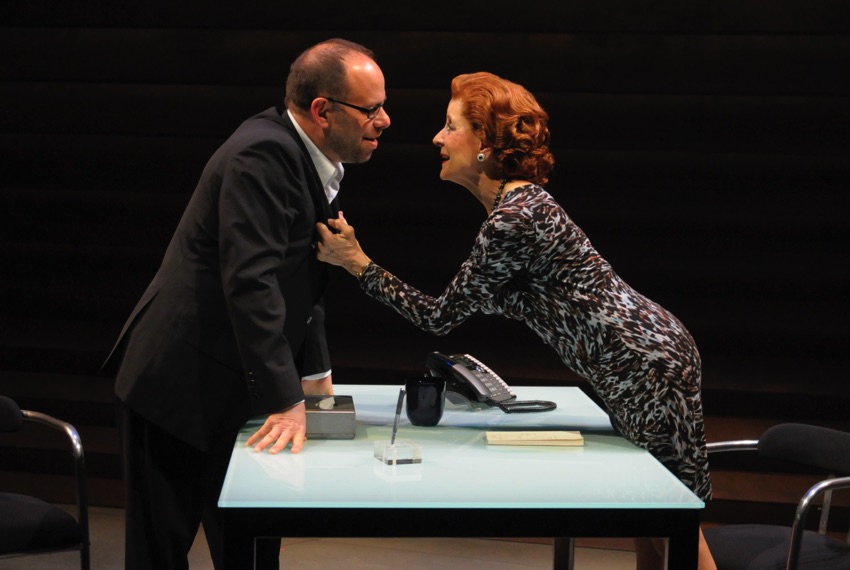
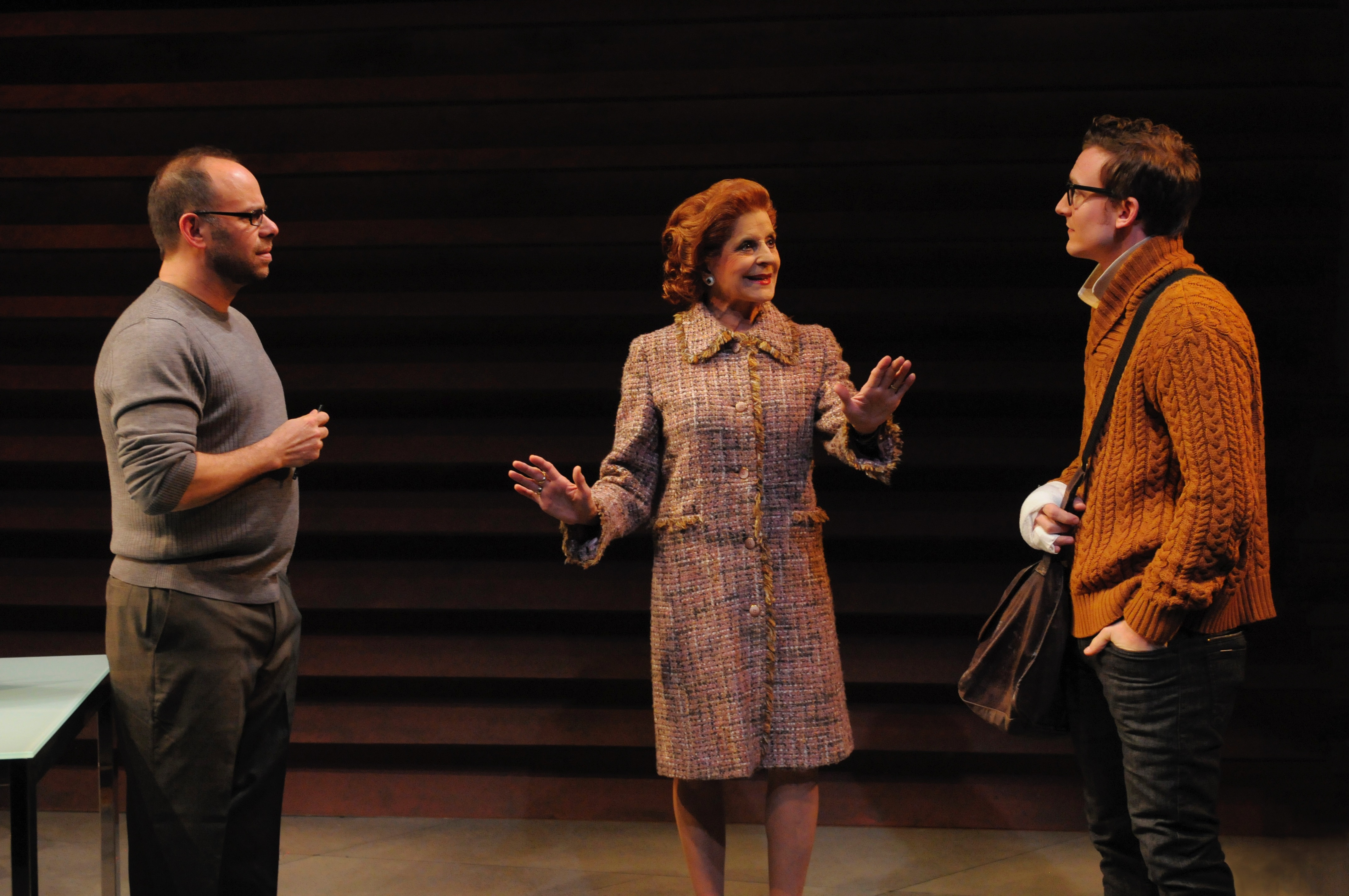
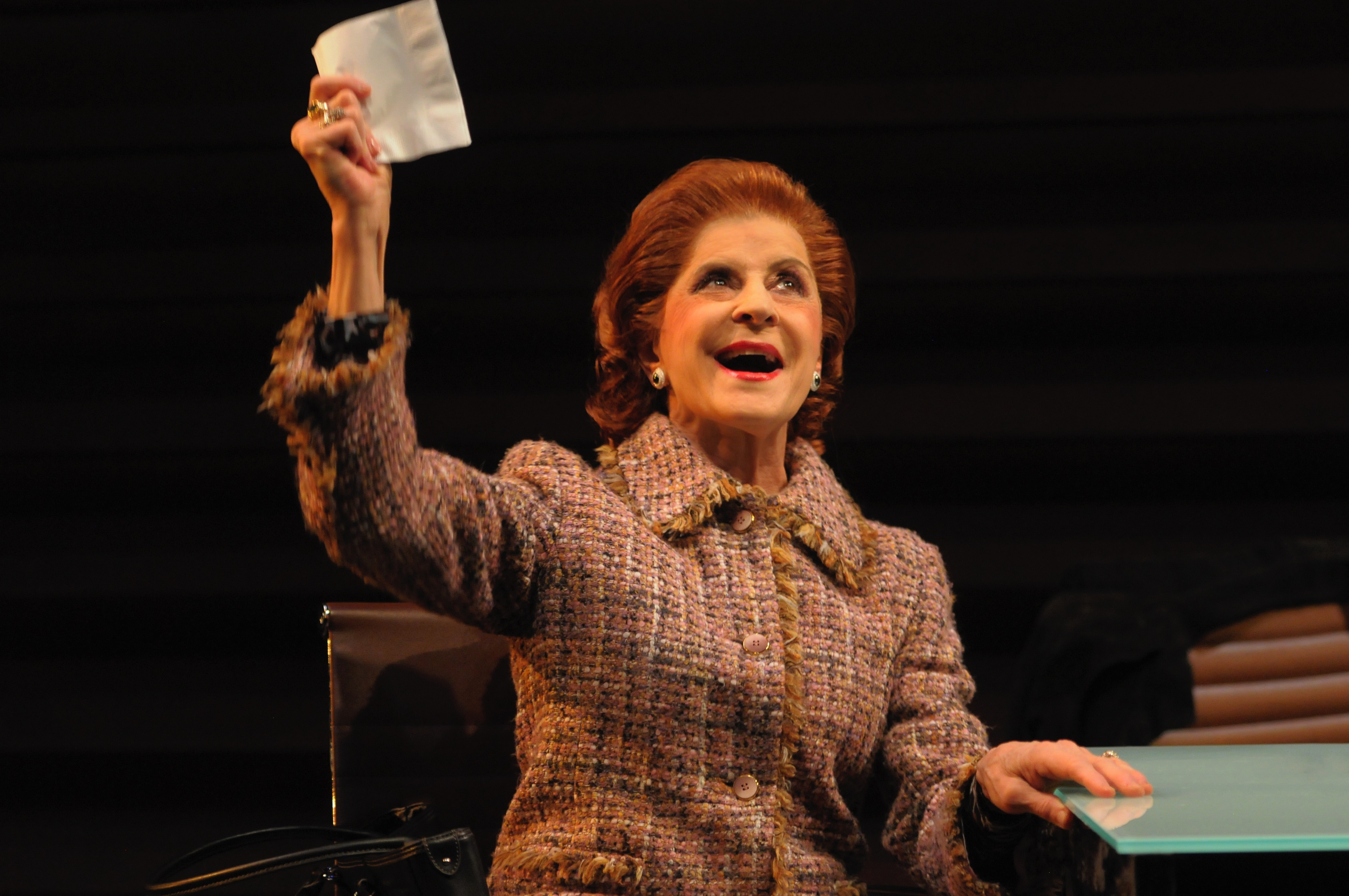
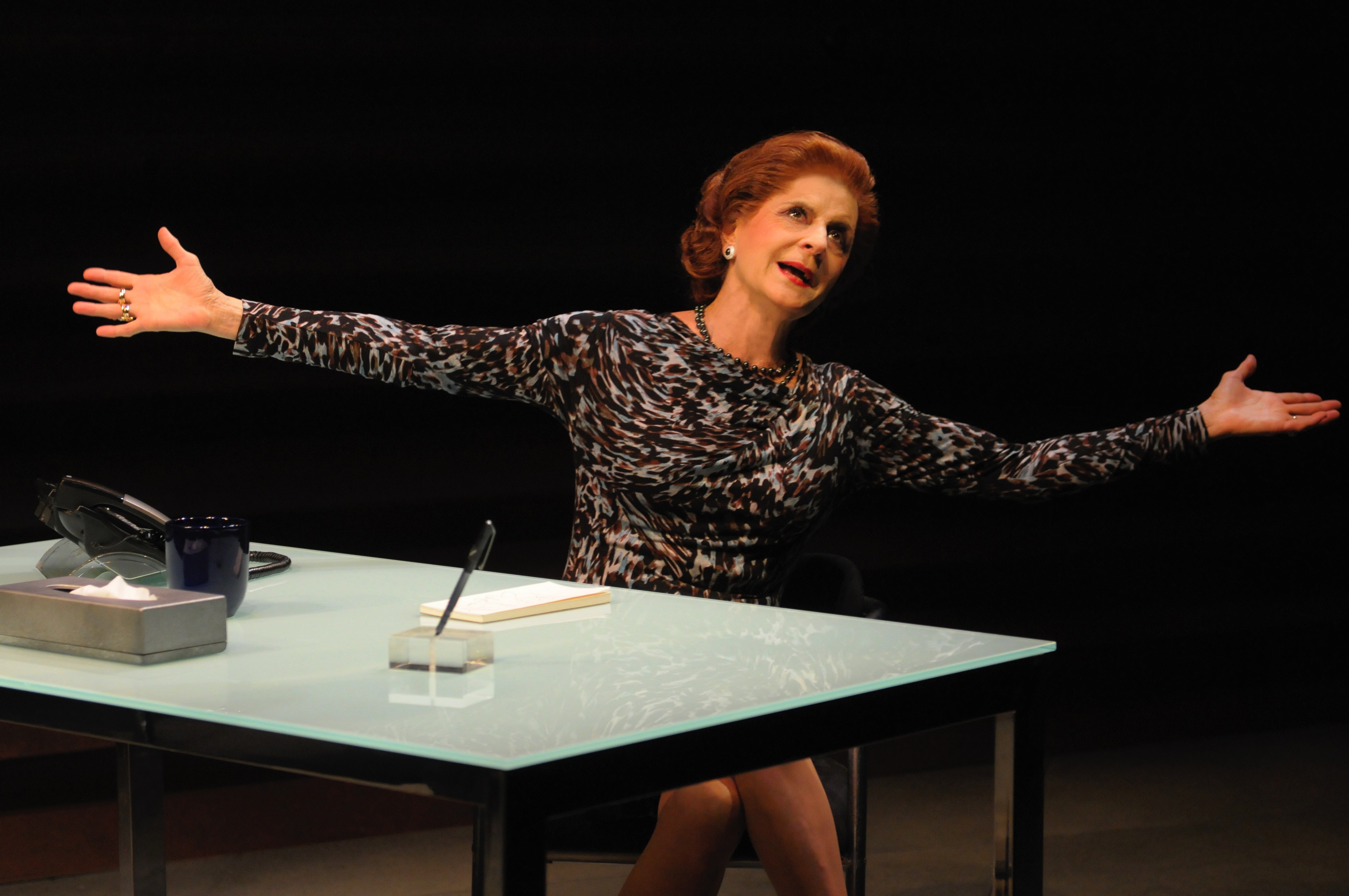
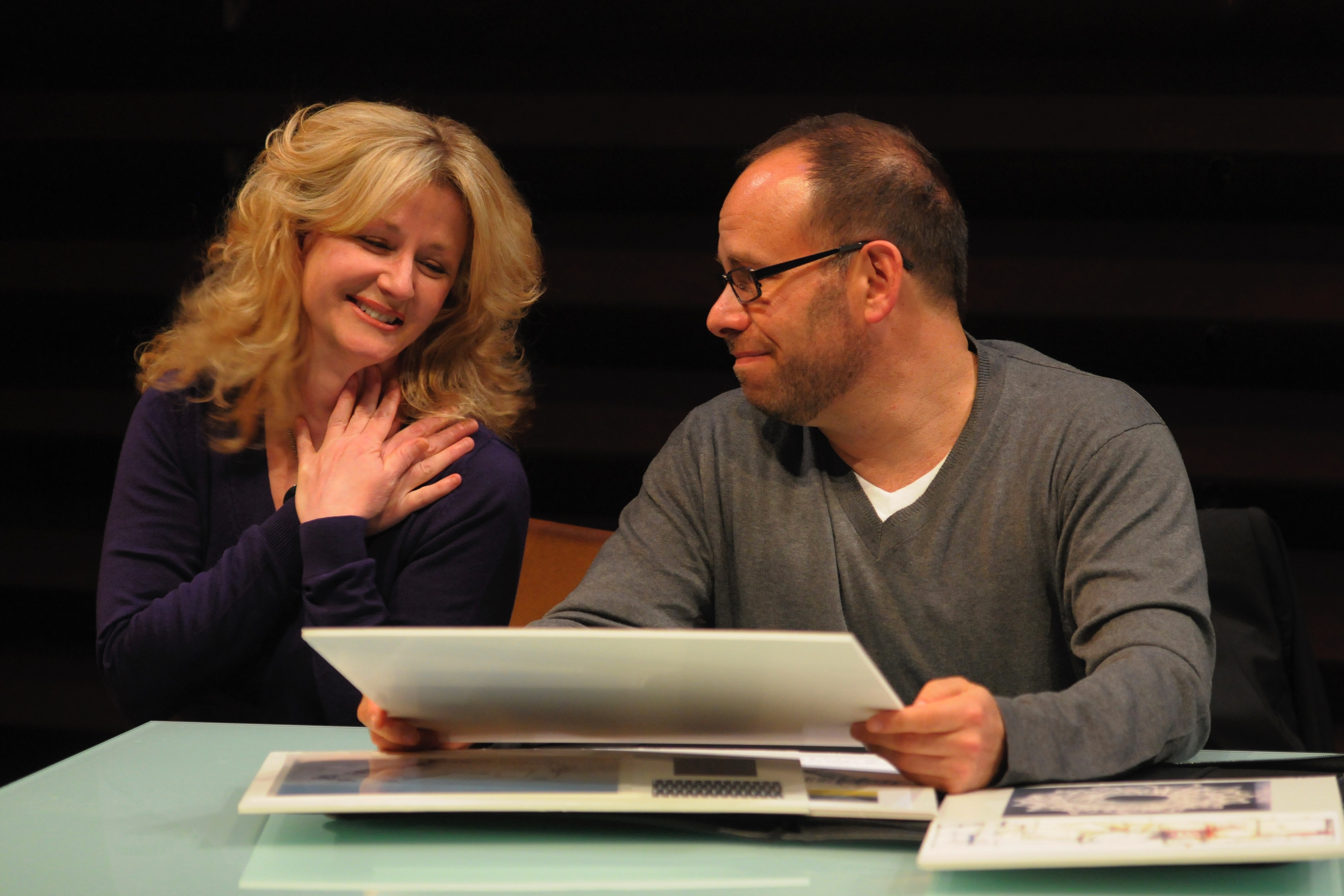
HIGHER, A.C.T. 2012, Andy Polk and Concetta Tomei, Photo by Kevin Berne
Cast of HIGHER, A.C.T. 2012, Photo by Kevin Berne
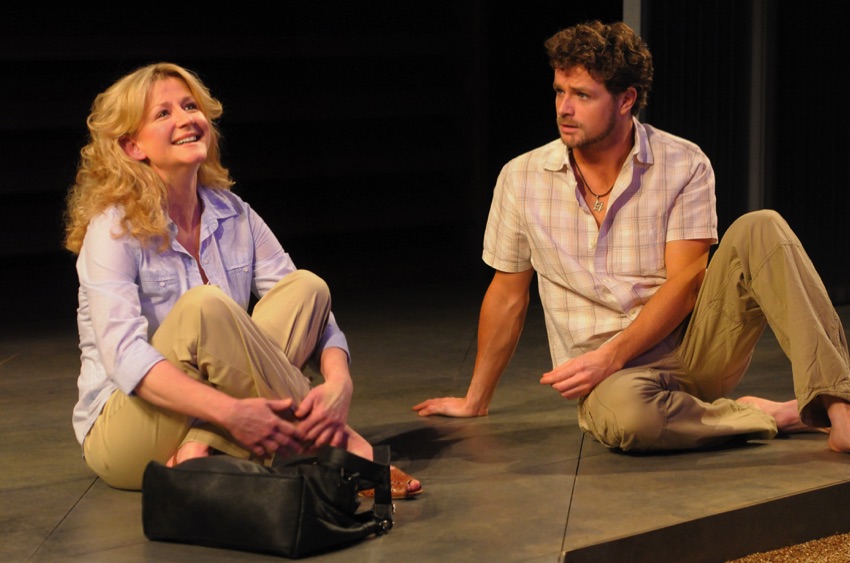
HIGHER, Alexander Crowther and René Augesin, A.C.T. 2012, Photo by Kevin Berne
HIGHER
by Carey Perloff
Winner,
2012 Blanche and Irving Laurie Theater Visions Award
Premiere, A.C.T. 2012
Directed by Mark Rucker
"Two architects who are also lovers compete to win a prized commission to design a memorial in Israel. Grief, desire, ambition and memory collide in this “intellectually and emotionally dense two-act drama."
–– SAN FRANCISCO EXAMINER
"PLAUDIT FOR PLAYWRIGHT"
"'Higher,' a play by American Conservatory Theater artistic director Carey Perloff, '80, has won the Blanche and Irving Laurie Foundation Theatre Visions Fund Award. The award of $50,000 is one of the nation's largest for playwriting and includes $25,000 to support the play's production, $10,000 for the playwright, and $15,000 for A.C.T. to commission two plays during the next year. In Higher, Perloff's fourth full-length play, two American architects entwined in a love affair unknowingly vie to design a high-profile memorial in Israel. The play premiered in February as part of A.C.T.'s 2011–12 season."
–– STANFORD MAGAZINE






